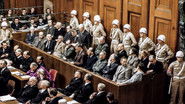pierre filmon
Yesterday evening, Paris cinema Etoile, 23.00 : Two masters of documentary together. Accompanied by his friend of 40-years Frederick Wiseman (who insists on Ophüls' talent for quality interviewing), Marcel Ophüls tells the public that "the memory of justice" is his favorite own film and that it was a public disaster when it came out in 1976 in the USA... The public is still vibrant with the nearly five hours projection (although the version projected is a 10 years old TV recording in DVD - the only existing 16mm copy seems to be in Germany in 29 reels).Very dense, tense and complex editing makes this film another fascinating film from the director. With wit and elegance, the film passes from one interview to another, focusing mainly on the lessons NUREMBERG trial left us, mainly through the point of vue of Telford Taylor (USA prosecutor at the trial) who as a character and in Marcel Ophüls' own words appears as "Mr Smith goes to Nuremberg" (he served also as historical adviser on the picture). Some Nazi talk to exonerate themselves, Albert Speer being the most controversial and in the same time most charismatic one. After having study NUREMBERG trial itself in the first part through archive images and long interviews of 1975's survivors of the facts, the film draws in the second part a parallel between Nazi atrocities, American exactions in Vietnam (contemporary to the shooting of the film) and French torture in Algeria...A single review cannot contain all the complexity of the film but I was surprised no review had been written before. If you are lucky enough to see this title aired on TV in your country or projected nearby, please watch it or go to the cinema and bring young people with you in order to learn more together and start a discussion... (If I noted it 7 out of 10, it is because my personal impression of the film was that the second part lasted a bit too long and was a bit confusing in its first hour (third hour of projection))

